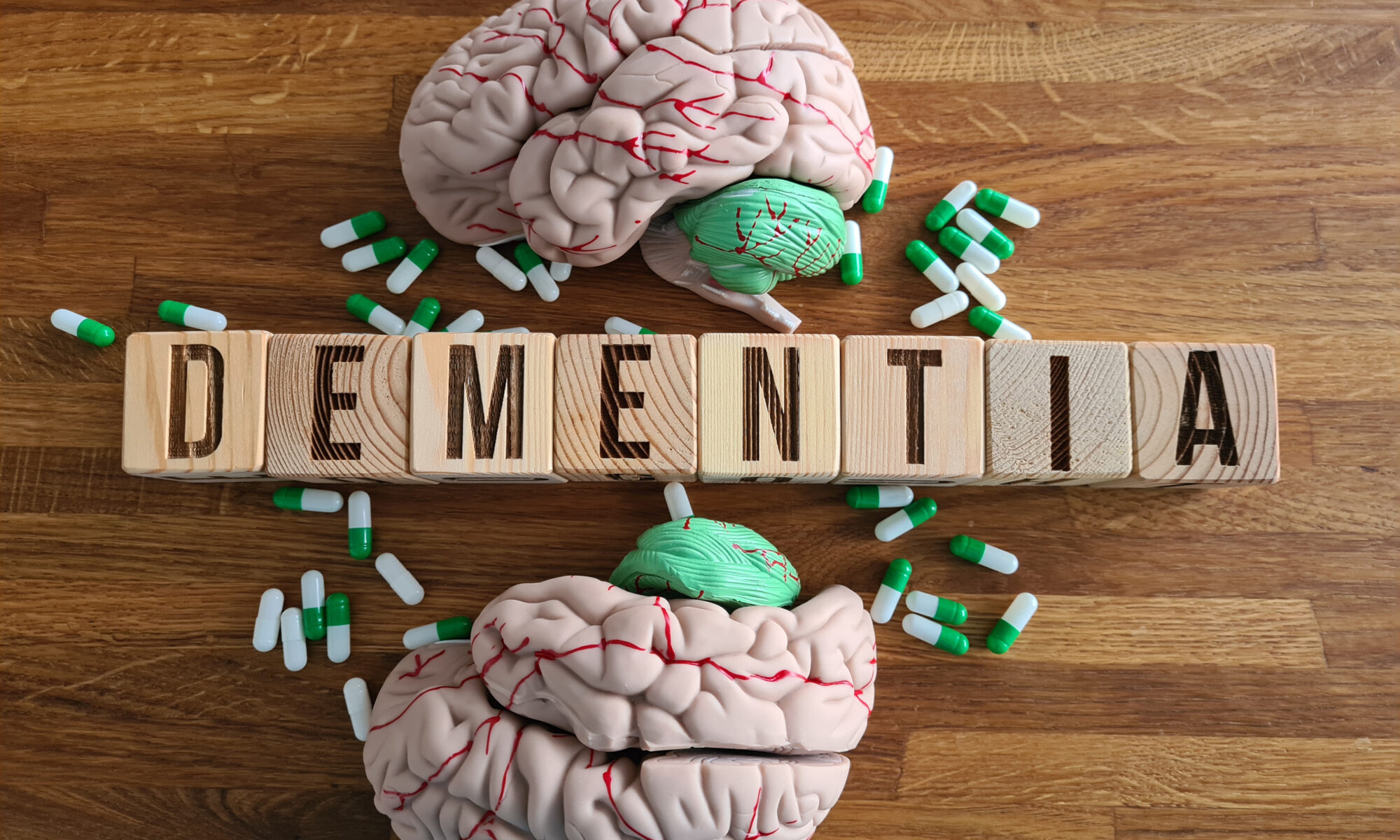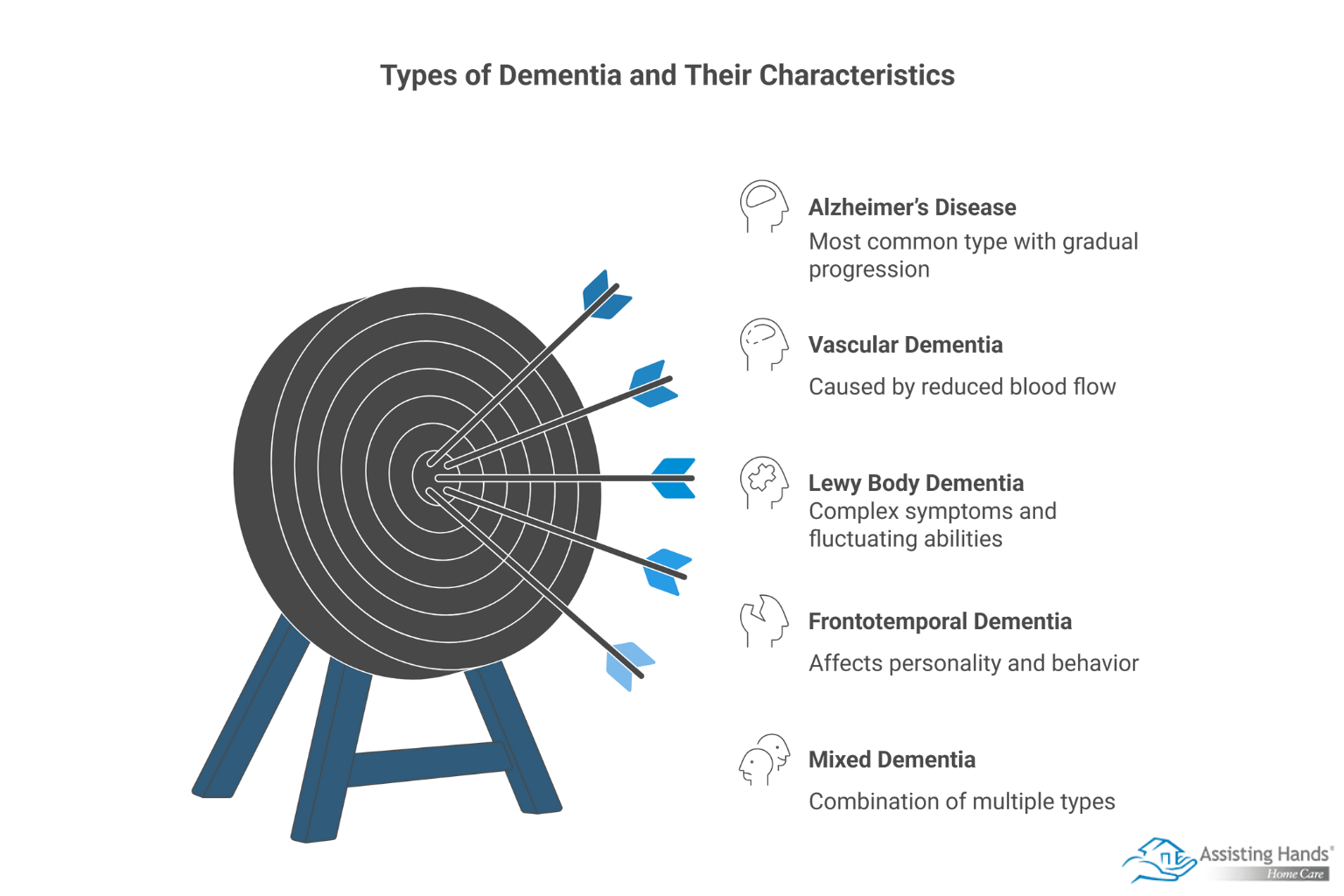
Table of Content
Dementia affects millions of seniors worldwide, yet many families remain unaware of the various forms this condition can take. Understanding the different types of dementia and their progression patterns helps families make informed decisions about care options, including whether in-home care or assisted living might be most appropriate for their aging loved ones.
Alzheimer’s Disease: The Most Common Form
Alzheimer’s disease accounts for 60–80 percent of all dementia cases, making it the most prevalent type affecting seniors. This progressive brain disorder typically develops slowly, with symptoms gradually worsening over several years.
Early-stage symptoms:
- Mild memory loss, particularly forgetting recent events
- Difficulty finding words or following conversations
- Challenges with familiar tasks like cooking or managing finances
- Confusion about time and place
- Changes in mood or personality
Middle-stage progression:
- Increased memory loss and confusion
- Difficulty recognizing family members and friends
- Problems with language and reasoning
- Wandering behavior and sleep disturbances
- Need for assistance with daily activities
Late-stage characteristics:
- Severe memory loss and inability to communicate
- Loss of physical abilities, including walking and swallowing
- Increased vulnerability to infections
- Around-the-clock care requirements
The progression typically spans 4–8 years from diagnosis, though this varies significantly among individuals. Many families find that in-home care during early and middle stages allows their loved ones to remain in familiar surroundings, which can reduce confusion and anxiety.
If your senior loved one has been diagnosed with a serious condition and needs help with tasks like meal prep, transportation, bathing, and grooming, reach out to Assisting Hands Home Care, a leading provider of home care families can trust. We also offer comprehensive care for seniors with dementia, Alzheimer’s, and Parkinson’s.

Vascular Dementia: Reduced Blood Flow
Vascular dementia results from reduced blood flow to the brain, often following strokes or other conditions affecting circulation. Unlike Alzheimer’s, vascular dementia may progress in steps rather than a gradual decline.
Common symptoms include:
- Problems with planning and organization
- Difficulty with decision-making and judgment
- Slowed thinking and concentration issues
- Mood changes, including depression or apathy
- Physical symptoms like weakness or paralysis
The progression depends largely on the underlying vascular condition and whether additional strokes occur. Some individuals experience periods of stability between episodes of decline, making personalized care planning essential.
Lewy Body Dementia: Complex Symptom Patterns
Lewy body dementia affects thinking, movement, behavior, and mood through abnormal protein deposits in the brain. This type presents unique challenges due to its fluctuating symptoms and combination of cognitive and physical effects.
Distinctive features include:
- Fluctuating cognitive abilities that change daily or hourly
- Visual hallucinations, often involving people or animals
- Movement disorders similar to Parkinson’s disease
- Sleep disturbances, including acting out dreams
- Extreme sensitivity to antipsychotic medications
Progression characteristics:
- Symptoms may vary dramatically from day to day.
- Cognitive decline tends to be more rapid than Alzheimer’s.
- Physical symptoms often appear early in the disease.
- Average survival time is 5–7 years from symptom onset.
The unpredictable nature of Lewy body dementia makes consistent personalized care crucial for managing symptoms effectively.
There are a variety of age-related health conditions that can make it more challenging for seniors to live independently. However, many of the challenges they face can be easier to manage if their families opt for professional senior home care. Richmond families can rely on expertly trained caregivers to keep their loved ones safe and comfortable while aging in place.
Frontotemporal Dementia: Personality and Language Changes
Frontotemporal dementia primarily affects the frontal and temporal lobes of the brain, leading to changes in personality, behavior, and language skills. This type typically develops earlier than other forms, often affecting people in their 50s and 60s.
Primary symptoms include:
- Dramatic personality changes and inappropriate behavior
- Loss of empathy and social skills
- Language difficulties, including difficulty speaking or understanding words
- Compulsive behaviors and changes in eating habits
- Lack of insight into behavioral changes
Progression patterns:
- Behavioral changes often appear before memory problems.
- Language difficulties may worsen rapidly.
- Physical symptoms typically develop later in the disease.
- Progression varies widely, typically spanning 6–8 years.
Mixed Dementia: Multiple Contributing Factors
Mixed dementia occurs when multiple types of dementia-related brain changes happen simultaneously. The most common combination involves Alzheimer’s disease and vascular dementia, though other combinations are possible.
Key characteristics:
- Symptoms may reflect multiple dementia types.
- Progression can be unpredictable due to overlapping conditions.
- Diagnosis often requires comprehensive medical evaluation.
- Treatment approaches must address multiple underlying causes.
Understanding mixed dementia helps families prepare for varied symptom patterns and care needs that may not fit typical progression models.
Aging in place can present a few challenges for seniors living with dementia. However, they can still live independently at home with the help of professional dementia care. Richmond families can rely on Assisting Hands Home Care to provide their elderly loved ones with mental and social stimulation, timely medication reminders, assistance with meal prep, and much more. Our caregivers are available around the clock to help your loved one live a happier and healthier life. To learn more about our premier in-home care plans, call us today.
